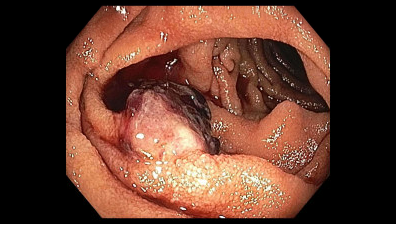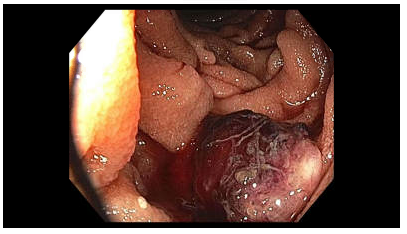Monday Poster Session
Category: GI Bleeding
P3106 - Metastatic Renal Cell Carcinoma: An Unusual Cause for Upper Gastrointestinal Bleeding
Monday, October 27, 2025
10:30 AM - 4:00 PM PDT
Location: Exhibit Hall

Kevin Chen, DO
University Hospitals Geauga Medical Center
Chardon, OH
Presenting Author(s)
Kevin Chen, DO, Mohammed Mazumder, DO
University Hospitals Geauga Medical Center, Chardon, OH
Introduction: Renal cell carcinoma (RCC) is a common tumor of the kidney and responsible for approximately 80-85% of primary kidney neoplasms. More commonly, RCC is known to metastasize to the lungs, lymph nodes, bones, brain, and liver. It is very rare to have metastatic RCC involvement with the intestinal tract. In this report, we describe a patient presenting with upper gastrointestinal tract bleeding later found to have renal cell carcinoma metastasis to the duodenum.
Case Description/
Methods: A 70-year-old male with a past medical history of renal cell carcinoma status post right nephrectomy and known metastasis to the lungs and liver presented for chemotherapy but was found to have dark stool output. His treatment regimen consisting of axitinib/pembrolizumab was deferred at the visit. Repeat bloodwork 1 week later showed a hemoglobin change from 13.5 g/dL to 6.4 g/dL. He was admitted for further evaluation and his stool tested positive for hemoccult. Despite receiving multiple units of blood over the course of 3 days, the patient continued to have hemoglobin levels less than 7.0 g/dL. Gastroenterology was consulted and recommended a colonoscopy which did find a medium-sized sessile malignant appearing mass with bleeding found in the fourth portion of the duodenum. After further discussion, surgical oncology advised for small bowel resection, which was uneventful. Pathology results confirmed metastatic RCC with tumor cells positive for PAX8 and negative for CDX-2. Despite the odds, the patient continued to progress well. Currently, his renal cell carcinoma appears to be stable on an experimental chemotherapy clinical trial.
Discussion: Renal cell carcinoma can present with a variety of signs and symptoms. However, many patients may remain asymptomatic until the disease is advanced. With metastatic disease, RCC has a 5-year survival rate of 12%. As in most advanced or metastatic diseases, RCC is typically not resectable and will receive systemic therapy with immunotherapy and/or molecular targeted therapy. Though not common, metastatic RCC to the gastrointestinal tract should be considered as a differential diagnosis for patients with signs of gastrointestinal bleeding, particularly in patients with a known history of renal mass or nephrectomy.

Figure: Figure 1: Medium-sized mass with stigmata of recent bleeding in fourth portion of the duodenum.

Figure: Figure 2: Alternative viewing angle of duodenal mass
Disclosures:
Kevin Chen indicated no relevant financial relationships.
Mohammed Mazumder indicated no relevant financial relationships.
Kevin Chen, DO, Mohammed Mazumder, DO. P3106 - Metastatic Renal Cell Carcinoma: An Unusual Cause for Upper Gastrointestinal Bleeding, ACG 2025 Annual Scientific Meeting Abstracts. Phoenix, AZ: American College of Gastroenterology.
University Hospitals Geauga Medical Center, Chardon, OH
Introduction: Renal cell carcinoma (RCC) is a common tumor of the kidney and responsible for approximately 80-85% of primary kidney neoplasms. More commonly, RCC is known to metastasize to the lungs, lymph nodes, bones, brain, and liver. It is very rare to have metastatic RCC involvement with the intestinal tract. In this report, we describe a patient presenting with upper gastrointestinal tract bleeding later found to have renal cell carcinoma metastasis to the duodenum.
Case Description/
Methods: A 70-year-old male with a past medical history of renal cell carcinoma status post right nephrectomy and known metastasis to the lungs and liver presented for chemotherapy but was found to have dark stool output. His treatment regimen consisting of axitinib/pembrolizumab was deferred at the visit. Repeat bloodwork 1 week later showed a hemoglobin change from 13.5 g/dL to 6.4 g/dL. He was admitted for further evaluation and his stool tested positive for hemoccult. Despite receiving multiple units of blood over the course of 3 days, the patient continued to have hemoglobin levels less than 7.0 g/dL. Gastroenterology was consulted and recommended a colonoscopy which did find a medium-sized sessile malignant appearing mass with bleeding found in the fourth portion of the duodenum. After further discussion, surgical oncology advised for small bowel resection, which was uneventful. Pathology results confirmed metastatic RCC with tumor cells positive for PAX8 and negative for CDX-2. Despite the odds, the patient continued to progress well. Currently, his renal cell carcinoma appears to be stable on an experimental chemotherapy clinical trial.
Discussion: Renal cell carcinoma can present with a variety of signs and symptoms. However, many patients may remain asymptomatic until the disease is advanced. With metastatic disease, RCC has a 5-year survival rate of 12%. As in most advanced or metastatic diseases, RCC is typically not resectable and will receive systemic therapy with immunotherapy and/or molecular targeted therapy. Though not common, metastatic RCC to the gastrointestinal tract should be considered as a differential diagnosis for patients with signs of gastrointestinal bleeding, particularly in patients with a known history of renal mass or nephrectomy.

Figure: Figure 1: Medium-sized mass with stigmata of recent bleeding in fourth portion of the duodenum.

Figure: Figure 2: Alternative viewing angle of duodenal mass
Disclosures:
Kevin Chen indicated no relevant financial relationships.
Mohammed Mazumder indicated no relevant financial relationships.
Kevin Chen, DO, Mohammed Mazumder, DO. P3106 - Metastatic Renal Cell Carcinoma: An Unusual Cause for Upper Gastrointestinal Bleeding, ACG 2025 Annual Scientific Meeting Abstracts. Phoenix, AZ: American College of Gastroenterology.
